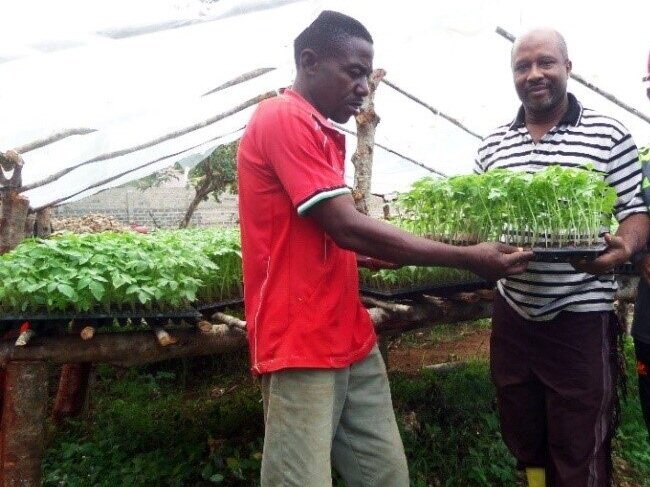Farmers in Zanzibar practiced poor agricultural practices. They were used to low productivity and failure was common. According to government statistics, for many years, Zanzibar was importing over 80% of fresh food from Tanzania mainland, including horticultural products. However, 2015 was a turning point, the Tanzanian Horticultural Association (TAHA) began to promote horticultural production in collaboration with the government of Zanzibar, FFD and the Milele Zanzibar Foundation. Today imports have declined from 80% to 40% and now most farmers in the region have a success story to tell.
Dr. Omar Mohamed Suleiman and his family of 4 children were among the poorest farmers in the region. At that time, he was a Medical Doctor at Mnazimmoja Referral Hospital, and also working as a farmer to provide enough for his family. He was producing tomatoes mixed with cucumbers in the family’s 1-acre farm, using traditional methods of farming which resulted in poor and low yields.
“I did my best trying to produce more with traditional farming methods, but it did not work as the environment kept changing. It was my desire to become successful in crop production, but failure in my early days while seeing others succeed made me realize that changes in my farming methods were inevitable.”- says Dr Omari Mohamed
Dr. Omar Mohamed Suleiman, 50 year old (on the right) in his seedling nursery after engaging in Horticulture farming practices and innovative technology as a TAHA Member.
Dr Omari joined TAHA in 2017 with the need to change to Good Agricultural Practices (GAP). The association also offers other services in addition to agricultural practices. The services include proper technological changes which result in higher yields, better quality and increased income.
“I knew very little about TAHA but my first step in joining TAHA was an eye opener to success. I realized that growing a successful crop means that you must develop all aspects of your farming system. Without TAHA, I would have not realized the potential that is within horticulture farming. TAHA trained me on how to plan and set goals, manage crops, connected me to input suppliers, and linked me with potential markets including tourist hotels", said Dr. Omari.
In one year, Dr. Omari has managed to get six times more income. Now his children attend a better school and can pay for college.
“TAHA has changed my way of thinking and gave me hope that, through knowledge and hardwork, everything is possible. Now I wish to send my children to study horticulture as I have seen its impact on changing someone’s life within a short period of time”, quipped Dr. Omari.
In Zanzibar many farmers are engaging in horticultural farming with the hope of achieving their dreams in life. Nevertheless, more support from the Government of Zanzibar, NGOs, and other development partners is still needed.











